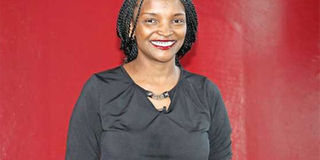A data driven approach to business

Mary Mwangi has a data-driven approach to business. PHOTO| COURTESY
What you need to know:
- After living in the us for over 20 years, Mary felt what she calls 'a responsibility towards home’ to do something impactful.
- "I found it strange that people had to withdraw money from an Mpesa agent to pay for their goods and services. Why couldn’t the shops just take Mpesa directly?”
She decided to create a system that allowed consumers to use mobile money at the till.
Mary Mwangi joined college to study computer science but a few semesters in, she decided to switch to business and accounts. Then she spent the next few years working in banking before moving to other industries’ audits and accounts departments.
All of this happened in the US, where she lived for over 20 years. Then she settled back home in 2012.
“I had been thinking about it for a long time,” she says. “My daughter was 11 and I thought if I was ever going to move, it would be easier before she became a teenager.”
She also felt what she calls ‘a responsibility towards home’. “It’s the feeling that you want to do something meaningful and impactful.”
The occasion to do so presented itself in 2011 while she was on one of her frequent visits to Kenya. “Mpesa was just picking up,” she says. “I found it strange that people had to withdraw money from an agent then take cash to a shop to pay for their goods and services. Why couldn’t the shops just take Mpesa directly?”
She decided to create a system that allowed consumers to use mobile money at the till.
ACCOUNTING BACKGROUND
“But coming from an accounting background, I wasn’t just interested in the transactions,” she explains. “I wanted to work on the businesses’ back-end as well. Businesses, especially the ones that operate through manual cash transactions, have problems with handling data. Automation brings in efficiency and transparency. Shops have multiple devices – an ETR machine, card readers from different banks, a cash register, and a phone for mobile money. It is difficult to reconcile those accounts.”
The solution was to bring a device that eliminated the need for all the others.
“From this one device,” she explains, “you can see how much you sold, how much is remaining in your inventory. We are connected to your banks and mobile-money provider; we give you analytics – you can see that at this particular time, when John is selling you get Sh8, 000 but when Jane is selling, you get Sh15,000. So you analyse performance.”
Although the plans for initialising mobile money payments fell through, the work she had put in helped her when the Government asked techies to help automate the transport industry.
Mary and her team felt they were ready to be part of the technical group. “But when we got there, we realised the project required more regulations and licenses than we had. We didn’t join that project but in the process, a bus Sacco liked our products and asked us to create an internal management system for them.”
This system includes a counting camera that allows the owner to know how many passengers go through the door and compare that with the tickets issued, and a GPS system that tracks the vehicle. She says bus owners are reporting about a 40 per cent increase in revenue since.
GROWING SMALL BUSINESSES
Mary’s passion is allowing small businesses to prosper, “I lived in the US long enough to see SMEs being run down by big corporations. That is going to happen here. Competing in future economies requires that businesses automate in a way that they can run themselves and free up the owner to pursue growth ventures.”
Even though she feels she has only scratched the surface, Mary is nevertheless pleased with the progress. “But it hasn’t been easy; the goal posts keep shifting,” she says.
Among the things she has had to sacrifice is a social life, noting that outside of her family, she only gets to go to work events. “Starting a business is a lot like having a baby; when they are small, they need a lot of time and money. The mother needs to spend a lot of time with them. But as they grow you can be more hands-off and let others help.”
Mary was brought up by a mother she defines as an astute business woman, and her sister is one of the company’s co-founders. Both are her source of support. “I’m lucky to have my family invest in me while the company finds its financial footing. But my advice to people who don’t have that kind of support is to start small and slowly, get a partner, ride on your networks as much as possible and negotiate a lot!”
She acknowledges that working in industries like tech and transport can feel like attempting to infiltrate a men’s club.
“I have done presentations where I felt like they weren’t paying attention or taking me seriously. It’s the tone in which I was addressed, as if I needed to wait for permission to speak. I can be extremely vocal, especially when I have conviction. When you are assertive as a woman, for some reason it is perceived as fighting. The other day someone told me to consider getting a few men as part of the co-ownership so that they can be the ones going for meetings,” she laughs.
Mary chooses to focus on her work. “I walk into business interactions thinking, what do I want from this and how do I package myself, without compromising my values, so that I get it? Being sensitive means being aware of my audience. Those sensitivities might help where assertiveness might be detrimental to what you are trying to do."





